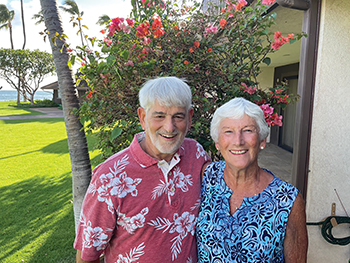Lung Cancer Survivor
Finding purpose in an unexpected diagnosis

Since 2013, retired Navy veteran Larry Gershon and his medical team have partnered in shared decision making to manage his Stage IV non-small cell lung cancer (NSCLC). He says education, self-advocacy and support have helped him navigate his treatments. Dedicated to helping others with lung cancer, Larry was recently recognized as GO2 for Lung Cancer’s 2023 Rays of Hope winner for his avid participation in the lung cancer community.
After I couldn’t shake a bad cold that had progressed to asthma-like symptoms, an X-ray showed a small spot in the upper right lobe of my lung. A CT, PET, surgical biopsy and brain MRI confirmed cancer. It was Stage IV because it had metastasized to my brain. This was definitely not a diagnosis I expected.
Fortunately, we had access to excellent medical facilities. My medical team included a skilled general oncologist and a thoracic oncologist who specializes in lung cancer. We agreed on a treatment plan that consisted of four rounds of chemotherapy followed by maintenance chemotherapy.
I was 65 years old and working full time. I was concerned that treatment would prevent me from providing for my family. Fortunately, my chemotherapy was on Tuesdays, and I didn’t feel the effects until the weekend. By Mondays, I felt well enough to be back at work.
During chemotherapy treatment, the genomic testing results came back from my surgical biopsy and showed I had a mutation known as an EGFR exon 19 deletion. That meant I was a candidate for targeted therapy; however, we were getting good results with chemotherapy, so we kept the targeted therapy option in our back pocket for use in the future.
After about a year of chemotherapy, I took a break from treatment. During that “chemo holiday,” I was introduced to GO2 for Lung Cancer, an organization then known as the Bonnie J. Addario Lung Cancer Foundation. That was the beginning of my education, empowerment and advocacy for myself. Most important, the support I received helped me know there is HOPE.
GO2 offers a Living Room series where medical professionals and thought leaders discuss the advances in lung cancer. It’s available in person, live via online streaming and by replay. The GO2 website has a library of past Living Room videos and is filled with information and resources for both patients and caregivers.
Because I was fortunate to learn so much about lung cancer, I felt the best thing I could do was give back by sharing that knowledge and supporting others. Truthfully, it helps me focus on something other than my own situation.
Along with sharing my experience as a survivor with researchers to help them as they work to improve lung cancer treatments, I’m a phone buddy for GO2. I talk with newly diagnosed patients about their diagnosis and treatment. I don’t give medical advice, obviously, but I talk about my own experiences. I offer support and often help them prepare for their appointments.
Staying up to date with new developments in lung cancer treatments helped me prepare for scan results that showed new tumors. I have had brain metastases treated with cyber knife and also surgically removed. A recent scan showed a new tumor in my lower right lung. I had a biopsy of the tumor to determine whether it was caused by a new mutation. The biopsy showed a new mutation in addition to the original EGFR mutation. It is a MET amplification. I am now taking two targeted therapies — one for the original EGFR mutation and another for the MET amplification. Scans a few weeks ago showed the combination is working well.
Over the years when scans have shown new areas of disease, I have had liquid (blood) biopsies or tissue biopsies. My recent experience was that the MET amplification did not show up in the blood, but it did in tissue. Both methods have their pros and cons.
I am now semi-retired, on my fourth line of treatment and feel fortunate to be able to enjoy my family and live an active life. I am hopeful the next great treatment option will be available in the future when I need it.
Advice from Larry
- Seek out a lung cancer specialist. I can’t emphasize enough how critical this is, either as your primary oncologist or as a second or third opinion. It is unfair to expect a general oncologist who treats all types of cancer to be up to date about every lung cancer innovation because there are so many.
- Consider clinical trials. Some focus on treatments and others on side effects, quality-of-life issues and more. I participated in a trial exploring the effectiveness of a product that detects circulating tumor cells.
- Advocate for yourself. It can be hard to find your voice, but it is easier when you are educated about your diagnosis. Learn about your lung cancer so you can take an active role in shared decision making with your medical team.
- Find support. Having my wife, family and GO2 by my side has been invaluable. Ask your medical team for referrals to other reputable resources.
- There is HOPE. More lung cancer treatments were approved by the FDA between 2017 and 2022 than in the 50 years combined before that!


